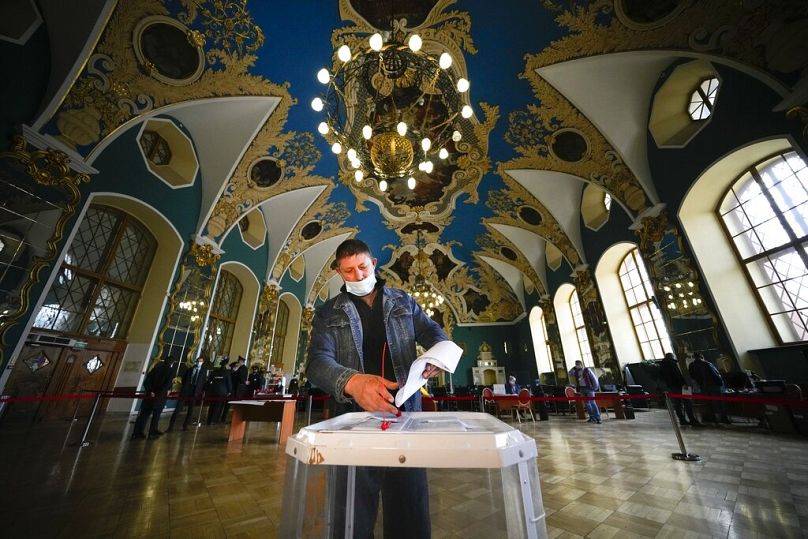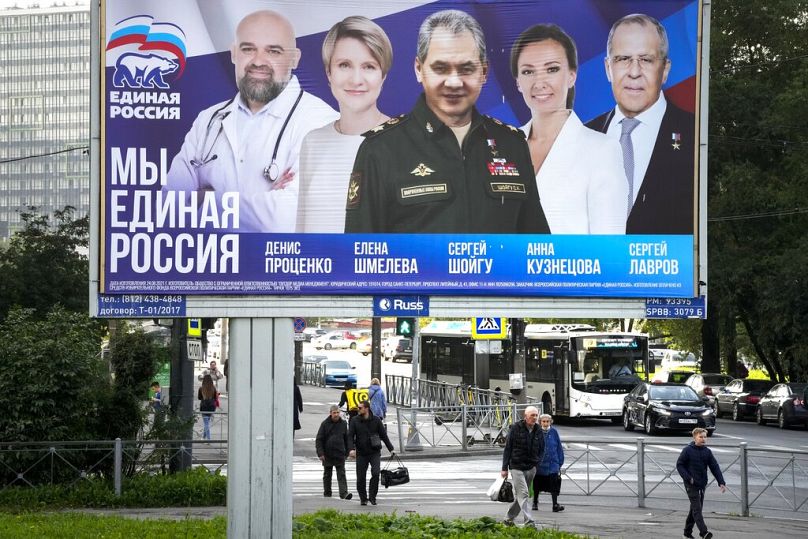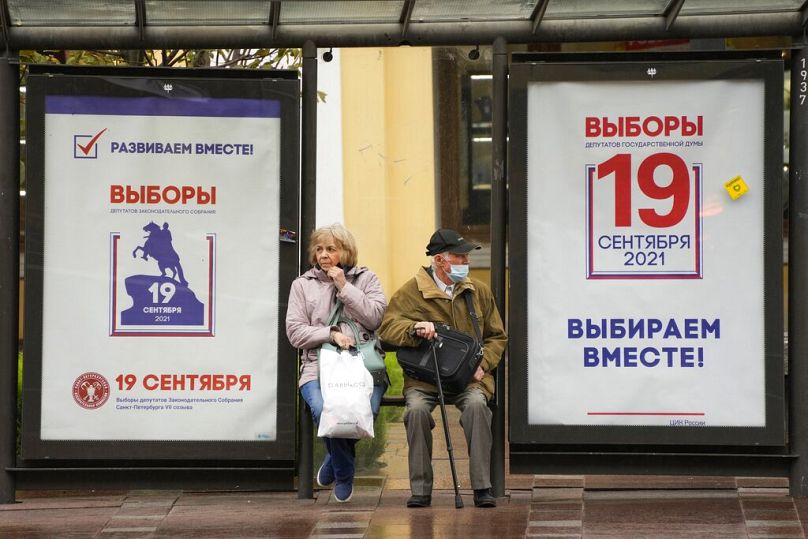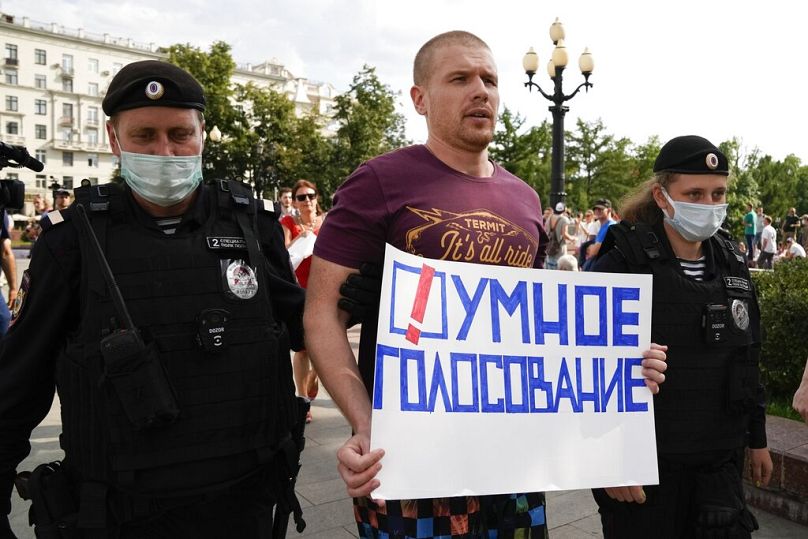This year's parliamentary election was marked by widespread allegations of ballot-stuffing and votes for sale, as well as ennui on the part of many voters after most serious opposition politicians were barred from running.
The polls closed in Moscow on Sunday evening after three days of voting in Russia's parliamentary elections.
 ADVERTISEMENT
ADVERTISEMENT
 ADVERTISEMENT
ADVERTISEMENT
The vote was a key part of President Vladimir Putin's efforts to maintain his grip on power ahead of the 2024 presidential election, in which control of the State Duma will be key.
But this year's election was also marked by widespread allegations of electoral violations, as well as ennui on the part of many voters after most serious opposition politicians were barred from running.
After mass protests earlier this year over the detention of opposition activist Alexei Navalny, Putin's United Russia party is expected to lose a few seats to groups like the Communist Party.
But the main competitors generally tow the Kremlin line, and in any event, United Russia is expected to comfortably hold its majority in the legislature.
One of the politicians excluded from running, the Kremlin-critical Ilya Yashin, cast his vote on Sunday, saying his rationale was "do what you have to and see what happens".
"We have done everything possible from our side to make the authorities' life more complicated, amid terrible pressure on the opposition," he said.
"But I don't have high expectations from these elections, because there are almost no parties on the ballot that represent people's interests."
President entreats Russians to vote
The leaders of the Communist and A Just Russia parties voted on Sunday in Russia's parliamentary elections. Gennady Zyuganov, head of Russia's Communist Party, had alleged widespread violations of electoral law before casting his own ballot in Moscow.
"I address all decision-makers," he said. "Don't be negligent, don't cook the numbers and don't steal the votes that the electorate makes... We don't need the votes given to others, but we won't allow our votes to be taken."
Russian President Vladimir Putin had urged Russians to vote on Friday after a lacklustre campaign season and United Russia's ratings at an all-time low in public opinion polls.
There are official concerns that low turnout could damage the ruling party's prestige. In an eleventh-hour video message on Thursday, Putin appealed to voters: "The election of the new parliament is, without doubt, the most important event in the life of our society and our country.
"We are all equally interested in responsible, efficient and respected people being elected... I count on your responsible, well-considered, patriotic, civic position."
The landscape of this weekend's vote
The Kremlin wants to retain control over the new parliament as it will still be in place in 2024 when Putin’s current term expires.
The long-standing Russian premier will then have to decide on running for re-election or choosing some other strategy to stay in power.
This year 14 parties are fielding candidates for half of the 450 seats in the Russian legislature's lower house. But the three parties - aside from United Russia - that are expected to gain the 5 per cent of support necessary to get a seat rarely challenge the Kremlin.
The other half of the seats are chosen in individual constituencies, where independent candidates or those from small parties such as the liberal Yabloko party may have stronger chances.
Polls indicate that general approval for United Russia is low. But nevertheless, the Russian independent Centre for Current Policy predicts it will score 299 to 306 seats: down from the 343 it currently holds but within the range of the 303 seats needed to change the constitution.
The Centre believes most of the seats lost by United Russia will be picked up by the Communist Party. But this party also largely conforms to the Kremlin line.
In addition to the Duma election, nine Russian regions will be choosing governors, 39 regions will be choosing legislatures and voters in 11 cities will be choosing city councils.
“There is very little intrigue in these elections... In fact, they will not leave a special trace in political history,” Andrei Kolesnikov, an analyst at the Carnegie Moscow Center, told AP.
Ethical concerns may cast a long shadow over outcome
The result could be more readily contested this year than in previous elections. The Organization for Security and Cooperation in Europe has said it will not be sending observers this weekend, saying Russia imposed excessive restrictions.
In August, Moscow also added independent vote-monitoring group Golos to its list of foreign agents. This does not block its work but could allow any findings it issues to be more easily dismissed by the Kremlin.
The Russian Elections Commission ordered voting expanded to three days, concluding on Sunday, to reduce crowding at the polls amid the coronavirus pandemic.
Critics have warned this could increase the risk of ballot manipulation. Commission head Ella Pamfilova rejected the claim, saying there would be “total video surveillance” of polling stations and that ballots would be in secure containers.
According to surveys by the Russian state-funded pollster VTsIOM, more than one in 10 workers say they have been given directives by their bosses on how to vote.
Ukrainian politicians also sounded the alarm on Thursday over polling stations being set up in the annexed Crimea, where Moscow has issued 600,000 passports to pro-Russian separatists ahead of the vote.
On Thursday, Russian foreign ministry spokeswoman Maria Zakharova also hit out at the European parliament on Thursday after the bloc said it was prepared to not recognise the results if it deemed them fraudulent.
"As in the past, we will defend ourselves against unacceptable interference in the national democratic process of the Russian Federation," she said. "We strongly condemn attempts by European deputies to manipulate European public opinion."
Eliminating the opposition
The head of Navalny's Anti-Corruption Foundation, Ivan Zhdanov, said on Friday morning that its "smart voting" app had been removed from Google and Apple stores, describing it as a "shameful act of political censorship".
The app informs voters which candidate is best placed to defeat United Russia in their constituencies.
"Russia's authoritarian government and propaganda will be thrilled," he added.
The ongoing detention of opposition leader Alexei Navalny promoted mass protests across Russia earlier this year.
Navalny's Foundation for Fighting Corruption and network of about 40 regional offices were outlawed as extremist groups in July, with many of his core team members arrested.
Some 50 websites run by either Navalny's team or supporters have also been pulled down by Russian authorities in recent months.
In 2019, the "smart voting" platform boosted opposition candidates who went on to win 20 of 45 seats on Moscow city council. In last year's regional elections, United Russia lost its majority in Novosibirsk, Tambov and Tomsk.
The Foreign Ministry last week summoned U.S. Ambassador John Sullivan to protest election interference by American “digital giants.”














